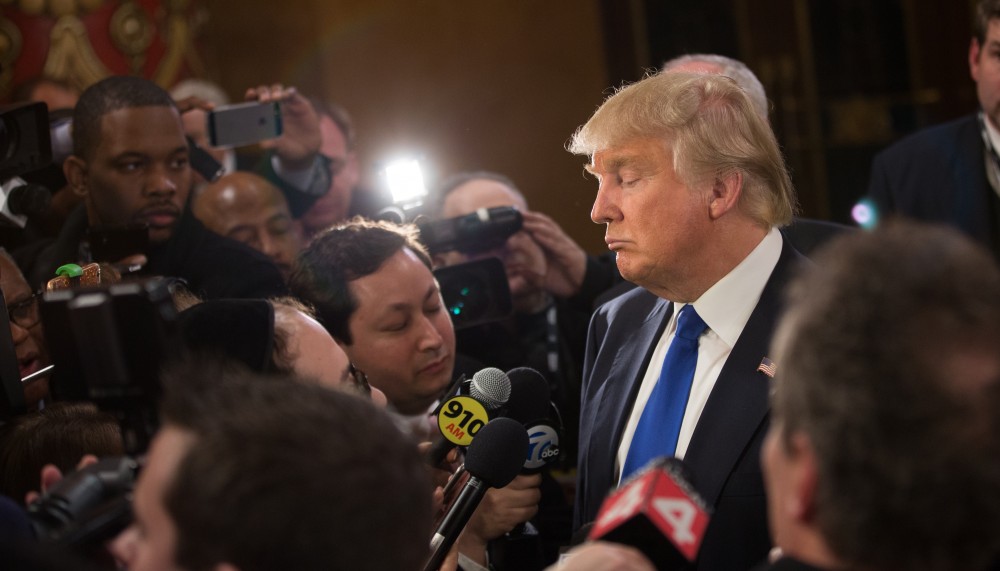GOP candidates fight it out in Detroit

GVL / Kevin Sielaff – After the debate, Republican hopeful Donald Trump answers questions from the press at the entrance to the Fox Theater in Detroit, MI on Friday, March 4, 2016.
Mar 4, 2016
DETROIT — For the first time this election cycle, presidential hopeful Donald Trump played more defense than offense, and he didn’t seem to like it one bit.
At the 11th Republican primary debate in the historic Fox Theatre on March 3, Trump squared off against the remaining three GOP challengers: Marco Rubio (R-Fla.), Ted Cruz (R-Texas) and Ohio Gov. John Kasich. This was the first debate in which Ben Carson did not attend.
Fox News moderators Megyn Kelly, Chris Wallace and Bret Baier all grilled Trump on his statements and accomplishments, at times including video clips of his past flip-flopping views. In addition to the moderators’ live fact-checking of Trump’s arguments, the businessman fielded attacks from both Cruz and Rubio, who appeared to put aside their own differences to go after the current Republican frontrunner.
Trump, who spoke much more than any other candidate on the debate stage, responded to the challenges with name-calling and frequent interruptions of other candidates. He repeatedly referred to his opponents as “Little Marco” and “Lying Ted.”
Cruz, in an attempt to lighten the mood, told Trump to breathe and “count to 10” to calm down.
A large amount of Trump’s airtime can be attributed to his 19 replies to other candidates, more than all the other candidates’ responses combined, according to political blog www.fivethirtyeight.com. Rubio, in particular, went after Trump for his former business ventures, including Trump University and Trump Steaks.
“You’re willing to say whatever you had to say to get them to give you their money,” Rubio said to Trump. “It’s the future of the United States and the most important election in a generation, and (Trump) is trying to con (people) into giving them their vote.”
Just four days away from Michigan’s March 8 open primaries, this debate was the candidates’ last chance to make a broad appeal to the state’s voters prior to voting day. Michigan’s 59 Republican delegates will be awarded proportionately on Tuesday to all candidates who draw in at least 15 percent of the vote.
By far, the candidate with the least airtime was Kasich, who was asked nine questions by the moderators compared to Trump’s 16 questions. When Kasich was given the floor, he emphasized his experience at the state and federal level.
“I talk about issues, I have never got into the scrums,” he said. “People say ‘You seem to be the adult on the stage.’ In Ohio, our wages grow higher than the national average, it’s a formula that works.
“And by the way, I won’t need on the job training because I know how to do all of this.”
Michigan will be a vital state for the Kasich campaign, as he is the only GOP candidate left in the race who has yet to win a primary. He remains hopeful that he will do well in upcoming elections after a disappointing Super Tuesday showing.
“You all wrote me off,” Kasich said. “It’s now March Madness and we’re heading up north, to my turf. I know how to bring people together, I’ve brought economic and wage growth. I’m going to keep bringing people together and motivating people in the neighborhoods.”
While little substantial policy was addressed during the debate, foreign policy and job creation took center stage. When asked about prior statements in support of waterboarding, Trump maintained his strong stance on fighting terrorism.
“I’m fine with waterboarding, and we should go tougher than waterboarding,” he said.
As rumors of an open, contested Republican convention gain more traction, moderators closed the debate by asking all candidates on stage if they would support one of their opponents, including Trump, should they not receive the nomination.
“I’ll support Donald if he’s the Republican nominee,” Rubio said. “The Democrats have two people left in the race. One of them is a socialist. The other one is under FBI investigation. We must defeat Hillary Clinton.”
All four candidates agreed to support whichever presidential hopeful receives the Republican nomination, which will be vital in unifying the GOP as the nation heads into the general election.
Prior to the polls opening on Tuesday, Bernie Sanders and Hillary Clinton will have their chance to appeal to Michigan voters on March 6 at the seventh Democratic debate. The debate, hosted by CNN, will be held at the Whiting Auditorium in Flint, Michigan.





















